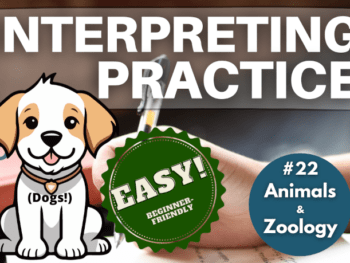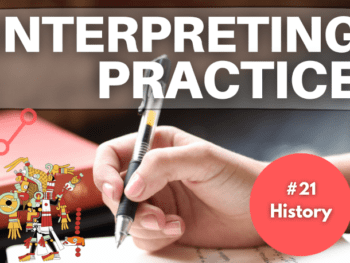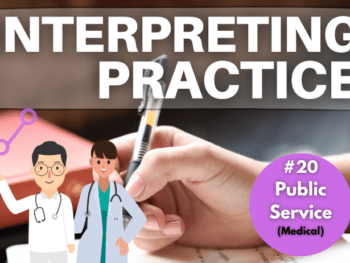Have you ever wondered how to become a professional translator? Find out a number of ways to start your career!
Let’s begin with the bad news: starting a career in translation is not easy for a number of reasons:
- Translation is a highly competitive industry that tends to be in a constant state of excess supply.
- There is a 9 out of 10 chance you will go freelance, so becoming a translator means you must learn how to deal with the instability.
- Your exact income will depend on a number of factors, but chances are it won’t make you rich.
If after reading this you are still considering freelance translation as your future career, then you will be glad to know there are also good news. In fact, depending on your personal goals and the lifestyle you intend to have, being a translator can be highly rewarding:
- Translation continues to be – despite many apocalyptic predictions – a growing industry with plenty of opportunities.
- There are several available options for new starters. Getting a degree is just one of the routes you can follow.
- Even if it won’t make you rich, you can still make a decent living as a freelance translator (again, depending on a number of factors).
Now that I’ve cheered you up a bit, let’s go down to bussiness. Here’s a number of ways you can become a translator.
This list focuses on the UK market, however I am sure it will be helpful no matter where you are!
Know Your Starting Point
If becoming a professional translator is a relatively new idea in your mind, the most important thing you can do at this stage is take a step back and understand where exactly you are at today. You need a very clear understanding of your starting point. This simple, introspective exercise – so often overlooked – is crucial to determining whether translation is the right career for you.

Start by asking yourself the following questions:
- How good are your writing skills in your native language? Is writing something that you enjoy and have continuously practiced over the years? Have you got a perfect grasp of grammar, syntax, punctuation, vocabulary, and so forth?
- How advanced is your knowledge of at least one foreign language? Do you consider yourself to be near-native?
- How well-acquainted are you with the culture of the foreign language(s) that you know?
- Do you see yourself as a perfectionist, with a sharp attention to detail and accuracy?
- Are you comfortable with the idea of working from home, bereft of any sort of social contact throughout most of the day?
- Are you prepared to work freelance, with no certainty as to how much you will earn at the end of each month?
If you have given any answer other than ‘very’ or ‘yes’, make sure you think very carefully about whether you really want to take the next step. The above points are part and parcel of being a freelance translator: there simply is no way around them. It’s always best to be brutally honest with yourself before you commit to something than brutally sorry after you have started.
Test Yourself
If after assessing your starting point you are absolutely sure translation is the right career for you, then it’s time to get some hands-on practice. Too many people jump head-first into the career path they believe is best for them without having had actual contact with the profession. As a result, contrary to their expectations, some realise they actually don’t like it.
Here’s a real-life example: while completing my MA, I met two students who found out they did not enjoy translating at all. This is all part of life and it’s never too late to change one’s path, but some damage was already done: by that time, they already had a few thousand pounds in student loan debt. Personally, I believe that could have been avoided had they tested themselves before deciding what to study.

Therefore, my best recommendation is that you learn by your own means whether or not you really enjoy translating. Testing yourself is very simple and costs you nothing more than a couple of hours of your time: just grab a short text taken from the Internet (around 300 words should do) written in your main source (foreign) language and try translating it on a Word file.
Tip: choose a topic you are passionate about. Every translator should aim to work professionally in a field of interest.
Get Qualified
One of the questions I get the most is ‘do you need a degree to be a translator?‘. Technically, the answer is no, you don’t need a university degree necessarily. But there’s a catch…
As already mentioned, excess supply tends to be the norm in the translation industry. Competition is fierce.
The daily life of an LSP (‘Language Service Providers’, most commonly referred to simply as ‘agencies‘) involves being approached by at least a dozen of translators offering their services. It is no coincidence that every well-structured translation agency has a dedicated Vendor Management department to handle the high volume of applications.

Because there are so many people out there offering translation services, knowing who to trust is not always easy. That is part of the reason why translation agencies have such a large market share: they have the resources to filter through the noise and assign work to freelance translators who are able to prove their quality; and such capacity is precisely why businesses (i.e., the end client) are more likely to trust an agency than a sole trader.
Having a qualification, though not strictly necessary, is therefore extremely important these days: it gives you credibility, and credibility is one of the most important things to find work.
The good news is, it doesn’t have to be a university degree. Training courses offered by a reputable professional body or similar institution are also a valid, more affordable solution to become a qualified translator.
Continue Reading: How to become a translator without a degree
Convert a Qualification You Already Hold
Although this is not the easiest route these days, some professionals have come into translation from a different background.
Throughout my career I came across a number of successful translators whose actual qualification was in subject areas such as law or medicine – typically students who completed their first cycle of studies, but decided not to proceed any further.
If you are in such a position, having some sort of qualification in a highly technical field (law, medicine, finance, engineering, architecture, etc.) may work to your favour in the long run: you already have an in-depth technical knowledge that most translators don’t.

Becoming a translator via this route is increasingly rare, but not totally impossible. In additional to your exact education background, your language portfolio may be another decisive factor. Some of the linguists I have worked with who fit this category translated either into/from high-demand languages (e.g. German) or languages with a low supply (e.g. Hebrew).
Needless to say, make sure you are realistic and well-aware of your starting point, as explained further up in this post. There is no points in investing your energy to become a translator if you don’t tick at least most of the key boxes.
Become an Accredited Translator
Once you have started offering your services to potential clients, becoming ‘accredited’ by a translation association or professional membership body is a highly recommended step to add an important layer of credibility to your professional profile.
The 2 main associations for practicing translators in the UK are ITI and CIOL. Any translator can apply, though you need to meet certain criteria to be accepted. Once you become a member, your profile is added to their ‘find-a-linguist’ directory, thus giving you a great deal of visibility too.

Here’s a good example of how this can positively affect your career: while working as Project Manager, sometimes certain clients would specifically ask me to make sure their files were translated by, say, an ITI-registered translator. That’s clear evidence that being recognised by a reputable membership association makes a translator more likely to be trusted by clients.
Apply for an European Commission Traineeship
Another way to become a translator is via an European Commission traineeship. Such internships have the advantage of being paid and are an excellent way of learning the job and enriching one’s CV.
You need to have completed at least a Bachelor’s degree to be considered, which doesn’t necessarily need to be related to translation or languages (although that is likely to increase your changes of being admitted). In addition, your language combination must consist of two EU official languages.

If you are a British national, unfortunately this may no longer be an option due to Brexit. However, considering the European Commission‘s website states that ‘a limited number of places are also allocated to non EU nationals‘, perhaps not all hope is gone.
Build a Solid Work Portfolio
Regardless of the route you decide to follow, building a good professional portfolio will help you increase your chances of getting work. This is quite easy for experienced translators to do but a huge challenge for new starters, who naturally don’t have many (or any) completed projects at a professional level yet.
If you are just getting started and struggling to get regular work, or if you are still a translation student or prospect, consider dedicating some of your time to translating content in your fields of expertise out of your own initiative.
In other words, volunteer as a translator to start gaining experience and build a translation portfolio.

Being a volunteer translator is an investment in your career. It will allow you to approach potential clients with some leverage, for you will be able to present a portfolio that shows you have completed a certain volume of translation from ‘language A to language B’.
I’ve put together a list of websites where you can register as a volunteer translator, just follow the link below:
Continue Reading: Best Websites For Volunteer Translators
A well-presented portfolio, even if just consisting of volunteer work, also displays commitment and professionalism, thus enriching your employability profile.
Be Serious About Your Business
One thing every good translator does is understand very clearly they are running a business. I can’t stress enough how crucial this point is.
I’ve been working in the translation industry since early 2017 and I have never met a translator (a successful one, that is) who doesn’t do this. Those who lack the commitment will always struggle to maintain a solid connection with their clients and make ends meet.

This may sound daunting if you have never run a business before. No need to fear! At the end of the day, it’s just like any other skill that requires a learning curve.
Sure, you will struggle at times and some important lessons will be learnt the hard way, however, this is one of the most essential skills a freelancer can learn.
Some of the things you should do include:
- Create a professional website to advertise your services.
- Run your home office like you would run a company’s office.
- Find ways to increase productivity during office hours.
- Handle every customer enquiry promptly and professionally.
- Keep good track of your business’s financial performance (annual income, gross and net profit, etc.)
- Keep yourself duly informed about your taxes and how to be tax efficient.
- Find new ways of getting regular work from customers and explore new streams of income.
Approach Potential Clients (And Be Persistent!)
Speaking of getting regular work from clients, one golden rule of being a translator is persistence. The life of most professional translators has an element of ‘feast and famine’, with alternating periods of intense work and little to nothing to do. You must be resilient during hard times; be prepared, you will most definitely face them at least once in a while.
It’s important to understand that in the beginning customers won’t come your way: you are the one who needs to go after them and make yourself noticed.

Start by approaching a selected number of translation agencies in order to get registered in their database. Keep doing this until you find yourself busy enough with paid projects.
Also be prepared to carry on contacting your customers even after you become well-established. As a freelancer you won’t have a guaranteed income, so when things get quiet it’s only natural that you start getting worried.
That may be the right time to approach your clients with a friendly email reminding them that a) you exist and b) you are fully available to take on any new projects in your language combination(s) and specialisms.
Never Stop Learning
Being business-oriented also involves a long-term personal development plan. A translator’s training is never completed: you need to keep learning new skills, both to keep up with this fast-paced, ever-changing industry, and to develop a unique professional profile that will make you stand out from the crowd.

The options are endless. How about learning a new language to add to your portfolio? Or a new specialism? A CAT tool or another useful piece of software? You decide, it’s your call. Just make sure you keep learning new skills to enrich your services and become a more valuable translator.
If you’ve found this post helpful or think it could be useful to a friend who perhaps is – or is planning to become – a translator or interpreter, please kindly consider buying me a coffee by using the button below:
I put all my heart and soul into the content I produce in order to help my fellow linguists set foot in the industry. Most of what I do is available to everyone for free.
Donating is 100% optional, but greatly appreciated. A short espresso will do! ☕









 21 Great Hacks for Productivity Improvement (Be More Productive!)
21 Great Hacks for Productivity Improvement (Be More Productive!)



Thank you. For your advise and very impressive presenting too. wish you all the best Nuno! keep being helpful.
Thank you Robel! 🙂